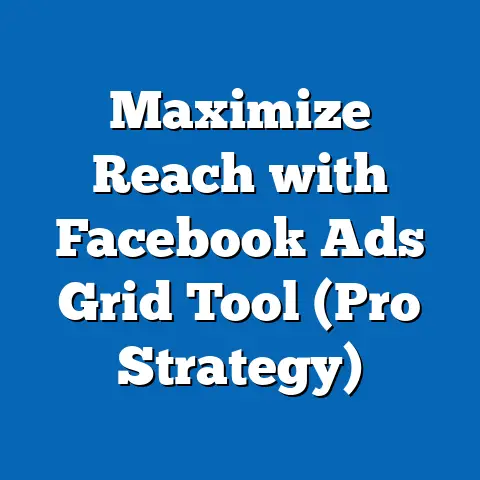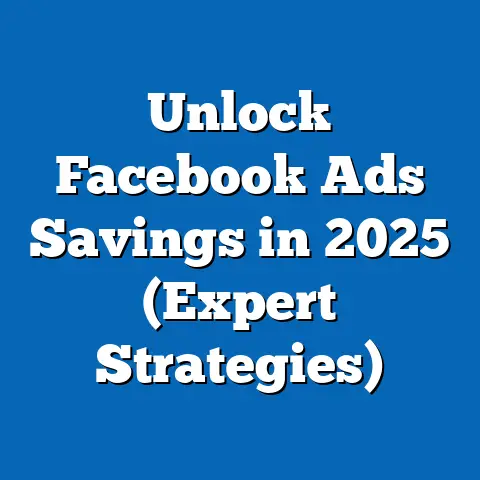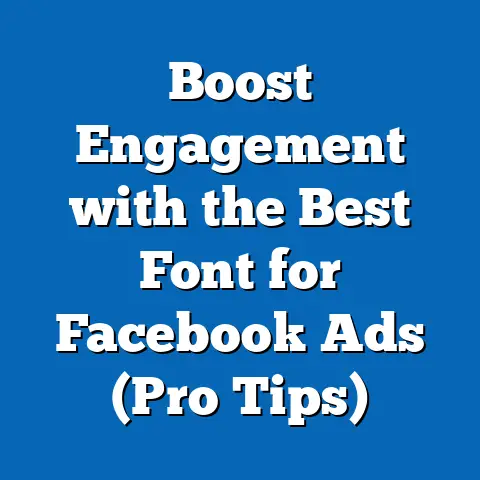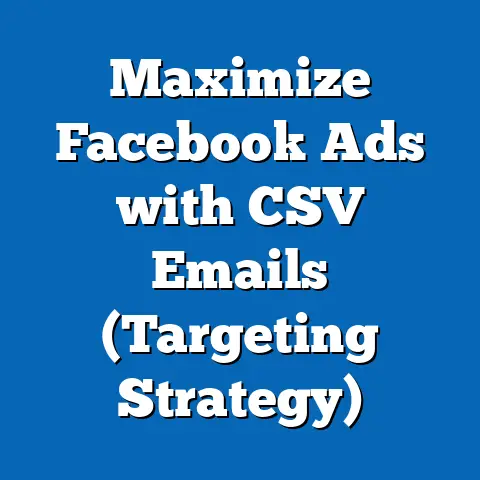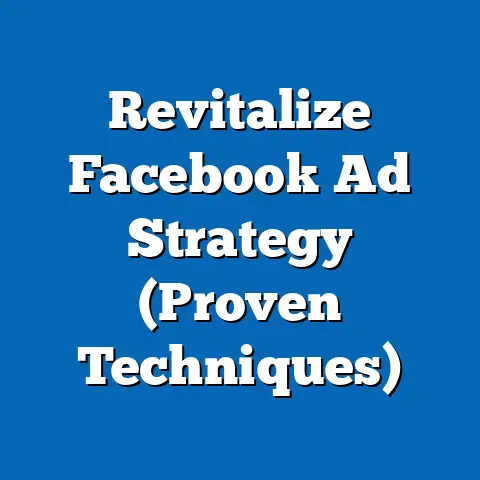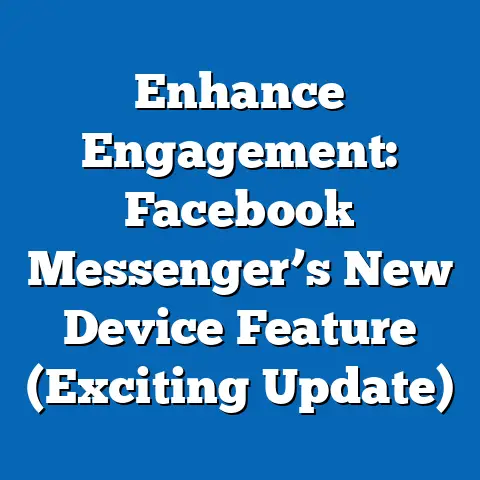Boost Facebook Game Ads Effectiveness (Expert Strategies)
Why are so many Facebook game ads failing to convert, while a select few are raking in profits?
It’s a question I’ve pondered countless times, especially after seeing marketing budgets vanish with little to show for it.
The gaming industry is fiercely competitive, and simply throwing money at Facebook ads won’t guarantee success.
What truly separates the winners from the losers is a combination of strategic thinking, creative execution, and a deep understanding of the platform.
Facebook game advertising is crucial for studios of all sizes, from indie developers to AAA giants.
It’s a powerful tool to reach millions of potential players, drive downloads, and build a thriving community around your game.
But to truly harness its potential, you need more than just a basic understanding.
You need expert strategies that transform your ad campaigns into successful, revenue-generating machines.
This guide is designed to be your roadmap to success in the world of Facebook game ads.
I’ll be sharing insights I’ve gained from years of experience managing and optimizing campaigns, helping you navigate the complexities of the Facebook advertising ecosystem and unlock its full potential.
We’ll dive deep into crafting compelling ad creatives, targeting the right audience, leveraging Facebook Pixel, and maximizing your budget for optimal ROI.
Get ready to turn your ad campaigns into victories!
Understanding the Facebook Advertising Ecosystem
Facebook’s advertising ecosystem is a complex beast, constantly evolving with new features and algorithm updates.
To succeed, you need to understand its core components, especially its unparalleled audience targeting capabilities, diverse ad formats, and the ever-mysterious algorithm that governs ad delivery.
One of the biggest advantages of Facebook advertising is its granular targeting.
You can reach users based on their demographics, interests, behaviors, and even their connections.
This is particularly powerful for game advertising, as you can target players who are interested in specific game genres, own certain gaming consoles, or have liked pages related to popular games.
Beyond targeting, Facebook offers a variety of ad formats, each with its own strengths and weaknesses.
From simple image ads to engaging video ads and immersive Instant Experiences, the possibilities are vast.
Understanding which formats resonate best with your target audience is crucial for maximizing engagement and driving conversions.
Finally, there’s the Facebook algorithm.
While its inner workings remain somewhat opaque, its goal is to deliver the most relevant ads to each user, creating a positive experience for both advertisers and users.
This means that your ad quality, relevance score, and bidding strategy all play a significant role in determining how often your ads are shown and how much you pay for them.
To understand Facebook, consider these key factors when advertising to gamers:
- Demographics: Know the age, gender, location, and income of your ideal player.
- Interests: Target users based on their interests in specific game genres (e.g., RPG, strategy, FPS), gaming consoles (e.g., PlayStation, Xbox, Nintendo), and popular games.
- Behaviors: Reach players who have engaged with gaming content on Facebook, such as liking gaming pages, joining gaming groups, or watching gaming videos.
To assess the performance of your game ads, you need to track key metrics such as:
- Click-Through Rate (CTR): The percentage of users who click on your ad after seeing it.
A high CTR indicates that your ad is relevant and engaging. - Cost Per Click (CPC): The amount you pay each time someone clicks on your ad.
A low CPC allows you to drive more traffic to your game’s landing page for the same budget. - Cost Per Acquisition (CPA): The amount you pay for each conversion, such as a game download or in-app purchase.
A low CPA indicates that your ad campaign is efficient and profitable.
Key Takeaway: Mastering the Facebook advertising ecosystem requires a deep understanding of its targeting capabilities, ad formats, and algorithm.
By focusing on relevance, quality, and engagement, you can increase your chances of success and drive meaningful results for your game.
Crafting Compelling Ad Creatives
In the crowded Facebook news feed, your ad creative is your first and often only chance to grab a user’s attention.
Visuals are paramount.
Think of it as the cover of your game – it needs to be instantly appealing and intriguing.
I’ve seen countless campaigns fail simply because the ad creatives were uninspired or irrelevant.
Don’t underestimate the power of a well-designed image or video.
It can be the difference between a user scrolling past your ad and clicking through to learn more.
Here are some expert tips on designing eye-catching ad creatives that resonate with your target audience:
- Use high-quality images and videos: This seems obvious, but it’s worth repeating.
Avoid blurry or pixelated images.
Invest in professional-quality visuals that showcase your game’s best features.
High resolution screen shots and videos are a must. - Incorporate storytelling elements: Connect with the gaming community on an emotional level.
Show gameplay footage, highlight compelling characters, or create a sense of excitement and adventure.
Tease the storyline of your game. - Test different formats: Don’t stick to just one ad format.
Experiment with carousel ads, video ads, and slideshow ads to see what works best for your game and target audience.
I’ve found that video ads often outperform static images, but it’s important to test different variations to find the optimal combination. - Highlight unique selling points: What makes your game different from the competition?
Focus on those aspects in your ad creative.
Do you have innovative gameplay mechanics, stunning graphics, or a captivating storyline?
Make sure these elements are prominently featured. - Use Text Sparingly: Facebook penalizes ads with too much text in the image.
Keep the text concise and impactful. - Consider Aspect Ratios: Optimize your creatives for different placements, ensuring they look good on both mobile and desktop.
A strong call-to-action (CTA) is essential for influencing user engagement.
Your CTA should be clear, concise, and compelling, telling users exactly what you want them to do.
Examples include:
- “Download Now”: This is a classic CTA that encourages users to download your game immediately.
- “Play for Free”: If your game is free-to-play, this CTA can be very effective in attracting new players.
- “Learn More”: Use this CTA to direct users to your game’s landing page, where they can learn more about its features and gameplay.
- “Join the Adventure”: A more creative CTA that appeals to users’ sense of excitement and adventure.
Key Takeaway: Compelling ad creatives are the cornerstone of successful Facebook game advertising.
By focusing on high-quality visuals, storytelling elements, and a strong call-to-action, you can capture user attention and drive engagement.
Don’t be afraid to experiment with different formats and variations to find what resonates best with your target audience.
Targeting the Right Audience
Effective audience targeting is crucial for optimizing Facebook game ads.
Reaching the wrong audience is like shouting into the void – you’ll waste your budget and get minimal results.
Audience segmentation allows you to divide your target audience into smaller, more specific groups based on their demographics, interests, behaviors, and other characteristics.
This enables you to create highly targeted ad campaigns that resonate with each segment, increasing engagement and driving conversions.
Here are some advanced targeting strategies that I’ve found to be particularly effective for Facebook game ads:
- Custom Audiences: Retargeting users who have interacted with your previous ads or visited your game’s landing page is a powerful way to re-engage potential players who have already shown interest in your game.
You can create custom audiences based on website traffic, customer lists, app activity, and more. - Lookalike Audiences: Finding new players who are similar to your existing ones based on their behavior and interests is another effective strategy.
Facebook’s lookalike audience feature allows you to create audiences that are similar to your best customers, increasing your chances of reaching users who are likely to convert. - Interest-based targeting: Leveraging Facebook’s interest categories to reach gaming enthusiasts or specific game genres is a great way to target a broad audience of potential players.
You can target users who are interested in specific game genres (e.g., RPG, strategy, FPS), gaming consoles (e.g., PlayStation, Xbox, Nintendo), and popular games. - Behavior-based targeting: Target users based on their online behavior, such as their purchase history, mobile device usage, and travel habits.
This can be particularly useful for reaching players who are likely to spend money on in-app purchases.
A/B testing is essential for refining audience targeting and improving ad performance.
By creating multiple ad sets with different targeting options, you can test which audiences are most responsive to your ads.
Experiment with different demographics, interests, and behaviors to identify the most effective targeting combinations.
Key Takeaway: Targeting the right audience is essential for maximizing the effectiveness of your Facebook game ads.
By using audience segmentation, advanced targeting strategies, and A/B testing, you can refine your targeting and reach the players who are most likely to download and engage with your game.
Leveraging Facebook Pixel and Analytics
The Facebook Pixel is a powerful tool that tracks user actions on your game’s website, providing valuable data for optimization.
It’s essentially a small piece of code that you place on your website, allowing Facebook to track user behavior such as page views, button clicks, and purchases.
Setting up and implementing the pixel effectively is crucial for gathering valuable data.
To install the Facebook Pixel:
- Go to the Events Manager in Facebook Ads Manager.
- Create a new pixel and follow the instructions to install the code on your website.
- Set up standard events to track specific user actions, such as page views, add to cart, and purchases.
- Verify that the pixel is working correctly by using the Facebook Pixel Helper browser extension.
Analytics can inform decision-making, allowing you to tweak campaigns based on real-time performance data.
By analyzing the data collected by the Facebook Pixel, you can gain insights into:
- Which ads are driving the most traffic to your website.
- Which landing pages are converting the best.
- Which user demographics are most likely to download your game.
- Which in-app purchases are most popular.
With this information, you can make data-driven decisions to optimize your campaigns, improve your landing pages, and target your ads more effectively.
Key Takeaway: The Facebook Pixel and analytics are essential tools for understanding user behavior and optimizing your Facebook game ads.
By setting up the pixel correctly and analyzing the data it collects, you can make informed decisions that improve your campaign performance and drive meaningful results.
Maximizing Budget and Bidding Strategies
Budget allocation for Facebook game ads requires careful consideration.
It’s not just about how much you spend, but how you spend it.
When allocating your budget, focus on balancing spending across various campaigns.
Don’t put all your eggs in one basket.
Instead, diversify your budget across different ad sets, targeting different audiences and using different ad creatives.
This allows you to test different approaches and identify the most effective strategies.
Different bidding strategies can be used for optimal results:
- Automatic Bidding: Facebook automatically sets your bids to get the most conversions for your budget.
This is a good option for beginners or for campaigns where you have limited data. - Manual Bidding: You set your bids manually, giving you more control over your spending.
This is a good option for experienced advertisers who have a good understanding of their target audience and conversion rates.
Monitoring ROI and adjusting budgets according to ad performance metrics is critical.
Regularly track your key metrics, such as CTR, CPC, and CPA, to assess the performance of your campaigns.
If you see that a particular ad set is performing well, consider increasing its budget to maximize its reach and impact.
Conversely, if an ad set is underperforming, consider decreasing its budget or pausing it altogether.
Key Takeaway: Maximizing your budget and optimizing your bidding strategies are essential for achieving a positive ROI on your Facebook game ads.
By diversifying your budget, choosing the right bidding strategy, and monitoring your ROI, you can ensure that you’re getting the most bang for your buck.
Conclusion
Boosting the effectiveness of your Facebook game ads requires a multifaceted approach.
It’s not just about creating flashy ads or targeting a broad audience.
It’s about understanding the Facebook advertising ecosystem, crafting compelling ad creatives, targeting the right audience, leveraging Facebook Pixel and analytics, and maximizing your budget.
I’ve seen firsthand how these strategies can transform struggling campaigns into successful, revenue-generating machines.
The key is to be data-driven, creative, and adaptable.
The Facebook advertising landscape is constantly evolving, so it’s important to stay up-to-date with the latest trends and best practices.
Remember, success in Facebook advertising is not just about spending more money but about being smart with your strategies and data.
By implementing the expert strategies discussed in this guide, you can elevate your Facebook game ads and achieve your advertising goals.
So, take action!
Implement these strategies in your own advertising campaigns and see the difference they can make.
Don’t be afraid to experiment, test, and refine your approach.
The more you learn, the better you’ll become at creating effective Facebook game ads.
Call to Action
I’d love to hear about your experiences with Facebook game ads.
Share your insights, ask questions, or reach out for further guidance in the comments below.
Let’s learn from each other and create a community of successful Facebook game advertisers!

